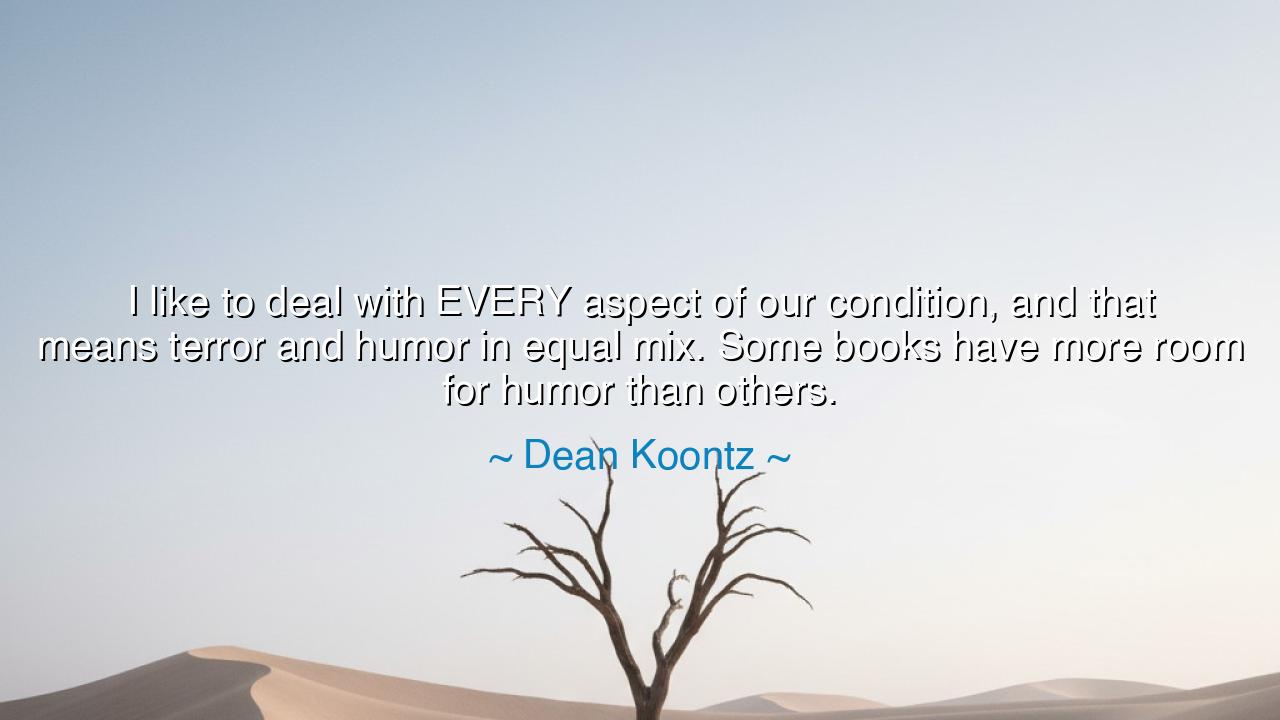
I like to deal with EVERY aspect of our condition, and that means
I like to deal with EVERY aspect of our condition, and that means terror and humor in equal mix. Some books have more room for humor than others.






“I like to deal with EVERY aspect of our condition, and that means terror and humor in equal mix. Some books have more room for humor than others.”
Thus spoke Dean Koontz, a master of storytelling and a philosopher of the human soul disguised as a writer of thrillers. In these words, he reveals not only his approach to art, but the ancient truth of existence itself — that light and shadow dwell together, that terror and humor, pain and laughter, are twin forces shaping the same human heart. His quote is a reflection on life’s paradox — that what is most frightening in us and around us often walks hand in hand with what is most redeeming and divine. To understand humanity, he tells us, one must embrace both the darkness that terrifies and the laughter that redeems.
For the human condition, as Koontz observes, is not a tale told in one tone. It is a tapestry woven of contradictions — grief and joy, despair and hope, cruelty and kindness. The one who seeks to portray life honestly must therefore deal with every aspect of it, unflinching and unafraid. To look only at the light is to paint a false picture; to stare only into darkness is to lose all sense of proportion. The wise know that truth lies in the tension between the two. And so, humor, the laughter that lightens the heart, becomes not a distraction from terror, but its companion — a shield against despair, a whisper of courage amid chaos.
Even the ancients understood this balance. The playwright Aristophanes, in ancient Greece, mingled satire with social critique, laughter with lament. His comedies, filled with absurdity and wit, revealed the folly of war, the corruption of politics, and the fragility of the human spirit. In his laughter, there was truth; in his jest, there was wisdom. Likewise, Koontz reminds us that humor does not trivialize suffering — it humanizes it. Laughter, rightly placed, becomes an act of defiance against terror. It says: “Yes, the world is terrible — but I am still here. I can still laugh.”
The terror that Koontz speaks of is not only the kind found in his novels, but the deeper terror of being alive — the awareness of mortality, the unpredictability of fate, the shadows within our own nature. To confront this terror with only solemnity is to be crushed by it. But when one meets it with humor — even dark humor — one transforms fear into something bearable, something shared. The laughter that arises from pain does not deny suffering; it redeems it. It is the soul’s way of saying that no horror, however vast, can silence the spirit entirely.
History gives us countless examples of this sacred duality. During the Second World War, in the bleak barracks of concentration camps, prisoners whispered jokes to one another — small fragments of humor amid unspeakable suffering. The great psychologist Viktor Frankl, who survived those camps, later wrote that “humor was another of the soul’s weapons in the fight for self-preservation.” Even in hell, laughter could flicker — faint, but unextinguished. So too does Koontz teach us that in stories, as in life, terror and humor are not opposites, but partners in survival. Where terror tests us, humor heals us; where one exposes our fragility, the other reminds us of our strength.
“Some books have more room for humor than others,” says Koontz, and so it is with life itself. There are seasons when laughter fills the air easily, and others when it is scarce — yet even in the hardest moments, a spark remains. The wise soul does not force cheerfulness where sorrow reigns, nor despair where joy might grow. Instead, they learn to read the rhythm of their own life, knowing when to cry and when to laugh, when to tremble and when to rejoice. The artist, the poet, the sage — all must discern this balance, for therein lies the truth of being human.
Thus, let this teaching be carried forward:
-
Embrace the fullness of life, for both joy and fear are your teachers.
-
Do not hide from darkness, but meet it with courage and curiosity.
-
Let humor be your ally, not as escape, but as renewal.
-
Seek balance, for wisdom grows not in extremes, but in harmony.
So spoke Dean Koontz, though in the language of fiction, as the ancients once spoke through parable and myth. His words remind us that the soul, like the universe, is vast enough to hold both terror and laughter, both tears and light. To deny one is to live half a life; to accept both is to live fully. And when we learn, as he did, to find humor even in the face of fear, we discover the secret resilience of the human heart — that it can tremble and still sing, weep and still wonder, fall into darkness and still look upward toward the dawn.






AAdministratorAdministrator
Welcome, honored guests. Please leave a comment, we will respond soon